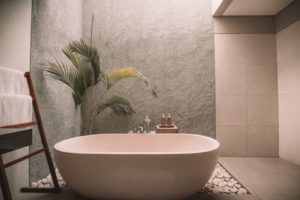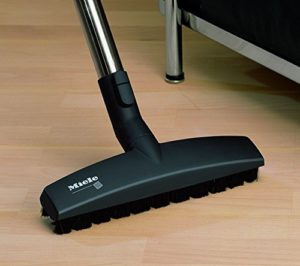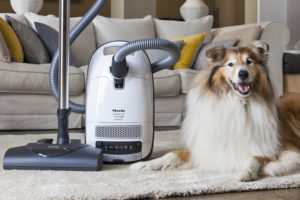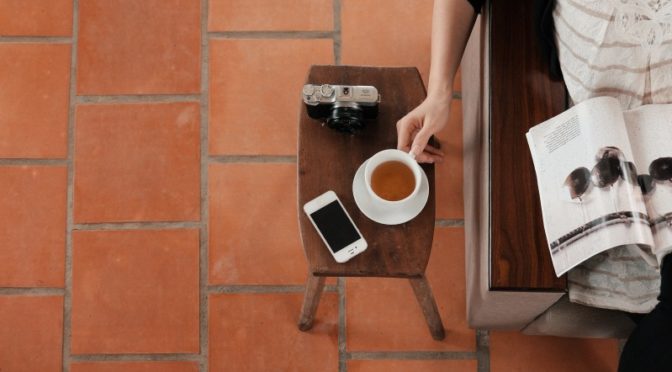
If you’re in the market for durable, buy-it-for life bare floors, you have four main choices: tile, vinyl, concrete, and hardwood. Of these options, you’ll rule out hardwood if you need waterproofing and you’ll rule out concrete if you want a floor that doesn’t feel like walking on a sidewalk. That leaves vinyl, which is basically plastic, and tile, which we’ll talk about today. Porcelain tile, specifically, is a subset of ceramic tile that’s even stronger and more resistant to water than ceramics. The versatility of porcelain as a surface cover means you’ll find it just about everywhere in society where durability and waterproofing are top priorities. However, as with any floor, it’s going to have advantages and disadvantages. Let’s take a look at them and figure out if porcelain floors are the right choice for your living space.
Porcelain flooring tiles are durable and can last a lifetime

Porcelain is chosen as a durable floor option the world over because it’s earned its reputation. A well-installed and well-maintained porcelain tile floor can last for 50 years or more. The material is dense, solid, and can resist a range of impact stresses, leading to its presence in home, office, and industrial environments.
When using it in heavy-duty residential or commercial applications, look for a PEI rating of 5 or more, which means it will work well in areas with high traffic and heavy equipment. The longevity of porcelain flooring makes it a good choice for environments where removal and replacement can be costly and disruptive.
Porcelain tiles are effectively waterproof and nearly stain proof

Ceramics are naturally water resistant, which is why they’re used the world over to make bath tubs, bath sinks, toilets, and dish ware. Because porcelain is highly dense, it’s even more resistant to water than normal ceramics, which may be more porous. You can further increase the liquid resistance of porcelain via melted glass glazes, which makes porcelain completely waterproof.
Due to its waterproofing, porcelain is also effectively stain proof. Since liquids can’t penetrate the surface, stains and dyes can’t either except in extraordinarily high concentrations. If porcelain is glazed, it becomes essentially impossible to stain or discolor.
Porcelain requires minimal maintenance and is naturally fireproof

Because porcelain is water and stain proof, it’s very easy to keep in good condition. Water can simply be wiped away with a towel or mop, and sweeping or vacuuming will help clear debris from the floor and maintain the glaze that protects the tiles. Any spills can be cleaned with cloths and rags as necessary, and you can disinfect messes with dish soap solutions.
A safety advantage of porcelain is its fireproofing. While porcelain does have a melting point (as does every solid), it’s thousands of degrees beyond room temperature, which means a porcelain floor will help keep fires and flames from spreading if you’re unfortunate enough to have one start in your home or office environment.
However, porcelain is expensive, heavy, and difficult to install

While porcelain has many advantages, three of the most significant drawbacks are its price of purchase, weight, and difficulty of installation. Ceramic is already on the high end of flooring prices, and porcelain tiles are on the high end of ceramic prices. Installation costs will add another 25-50 percent to your out the door cost, although this will vary with where and how you’re installing them. That said, when buying floors that will last for as long as you live in a home, you can afford to spend a bit more now for long term security.
The installation process itself is time-consuming and not for the feint of heart. Porcelain, like any hard floor tile, is heavy, meaning you’ll need both experience and specific tools to get the job done if you attempt it on your own. You’ll need to make precise cuts around cabinetry and walls, which will be complicated by the hardness of porcelain; imagine trying to cut out part of a toilet bowl and you’ll have an idea of what’s ahead of you. Of course, a contractor will have the skills and equipment necessary to get the job done, but you’ll also pay for the privilege. And porcelain can’t always be installed on second and higher stories due to the weight of the flooring; you’ll need to make sure your home is capable of supporting it first.
The grout is vulnerable to damage
While it’s next to impossible to damage porcelain tiles themselves by water ingress, staining, or physical trauma, you need to keep the lines that frame the tiles in mind: the grout is the weakest part of any tile installation. If you don’t seal it, it’s going to let water in, which can undermine your porcelain installation. Even if it’s well sealed, humidity and chronic standing water can still impact the grout, leading to mold and mildew problems if you don’t follow up with cleaning and resealing.
Which vacuum cleaners can clean porcelain tile and carpets effectively?

While just about any vacuum can clean porcelain tiles, there aren’t many that will clean tiles and any pile and style of carpet effectively, as both surfaces can require vastly different settings from the same machine. To care for bare floors, we recommend vacuums with Parquet heads, as these heads will both polish porcelain tiles while efficiently chasing down dust, grime, and pet hair instead of simply blowing it around due to suction.

Meanwhile, for carpets, we recommend vacuums with powered electric brush heads that can effectively tackle a range of residential and commercial styles as well as low-, medium-, and high-pile fibers. Two vacuums that fit the bill are the Miele Complete C3 Cat & Dog (reviewed here and here) and Miele Compact C2 Electro+ (reviewed here and here). Both include Parquet and electric brush heads to give you the power to clean any surface in your home or business.
![]() You can buy the Miele Complete C3 Cat & Dog here on Amazon or buy the Miele Compact C2 Electro+ here.
You can buy the Miele Complete C3 Cat & Dog here on Amazon or buy the Miele Compact C2 Electro+ here.
![]() Canadians can buy the Miele C3 Cat & Dog here or buy the Compact Electro+ here.
Canadians can buy the Miele C3 Cat & Dog here or buy the Compact Electro+ here.
 If you find our research on PMC helpful, you can follow our efforts to keep maniacally reviewing home cleaning tools by shopping through our links above. We promise to keep fighting the good fight against every horror children, animals, and grown, yet messy humans can inflict upon a clean home.
If you find our research on PMC helpful, you can follow our efforts to keep maniacally reviewing home cleaning tools by shopping through our links above. We promise to keep fighting the good fight against every horror children, animals, and grown, yet messy humans can inflict upon a clean home.

